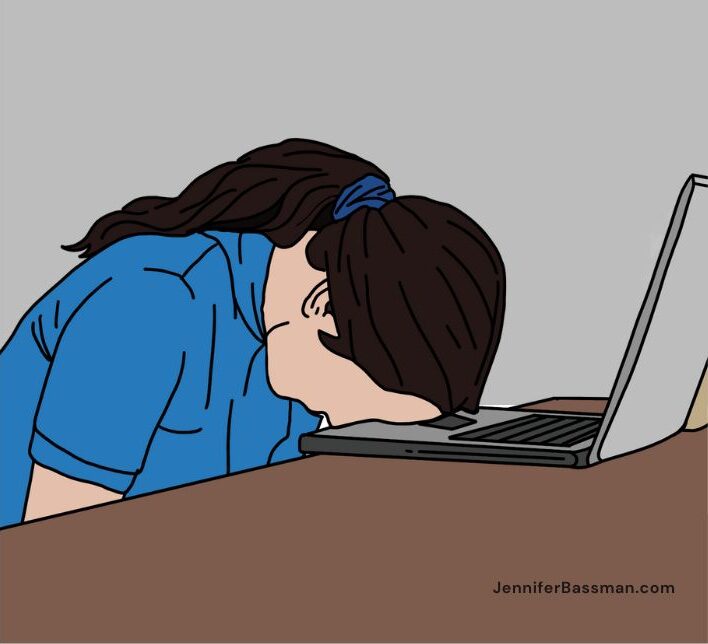This quote that reminds me about burnout and overwhelm sits beside my desk:
“You don’t have to figure out everything today. You don’t have to solve your whole life tonight. And you don’t have to tackle everything at once. You just have to show up and try. You just have to focus on the most immediate thing in front of you. And you have to trust that you’ll figure out the rest along the way.” – Daniell Koepke
I’m mad Daniell didn’t write her book a lot sooner because coming across this quote when I had no idea how to manage my overwhelm would have been a huge help.
I’m one of those people who needs to be told over and over that I don’t have to do all of the things.
Pretty much everyday I am tempted and baited by alluring offers, projects, and people. I want to know all of the things and share them with everyone.
This turned out to be a driver of my burnout.
Why Are Burnout And Overwhelm Besties?
Oy. How much time do we have today?
Overwhelm is a cousin of stress. It’s one of the most common emotions associated with burnout. It is one of the most common because you and I have chosen to ignore the red flags, the alert signals, and the Mayday call that our brains and bodies are sending us.
The reason that overwhelm happens, is often misattributed to external sources – the world conspiring against you, that annoying coworker or employee, people asking you to do everything, or even a traumatic experience.
But, this isn’t really true.
Overwhelm actually happens most of the time because we fail to manage ourselves. We fail to manage our thoughts and feelings.
There are, of course, exceptions to this, but those exceptions are few and far between. The only time that overwhelm isn’t your fault is when something is completely out of your control. (Think a traumatic event or illness, bad weather, or a pandemic.)
Some of the causes of overwhelm that are your doing can include:
- Work responsibilities
- Unrealistic expectations and standards
- Financial worries
- Political issues
- Relationship stressors
- Annoying coworkers
- A difficult project or work
- Feelings of uncertainty
- A (perceived) lack of control
The things on this list are controllable and manageable by you. Things that you either allow in your life, don’t respond to in a meaningful way, or you don’t know how to fix it. A lot of the callouts on this list can be solved by simply saying “No.”
Why Are You Yelling At Me, Jennifer?
By now, you may or may not be aware that I am a direct person. Burnout and burnout recovery require a direct and honest approach. Know, that I love you enough to be this person.
I spent a lot of time in burnout blaming everyone else for my life that had become out of control and miserable. It was a lot easier than facing the person in the mirror that was allowing my life to be this way. Me.
At first, I thought me being the problem for my consistent overwhelm made me a dumb person. Overwhelm has absolutely nothing to do with intelligence. It has everything to do with how you manage your thoughts and feelings. (I promise I’ll explain.)
Managing overwhelm is difficult for almost all of us. The world is a tough place that asks so much of us all of the time. It’s difficult to find the filters you need to turn on for the parts that aren’t a priority or your responsibility.
Why Thoughts And Feelings Are To Blame
There is often a pattern of behaviors and missed or ignored signals that lead people to overwhelm. Those patterns and missed signals are trying to tell you to stop or slow down before you become completely overwhelmed. Signals and patterns missed can include things like poor stress management habits, people pleasing behaviors, perfectionism, unrealistic expectations and standards, a lack of boundaries or an inability to say no.
What often keeps you from paying attention to those signals is that you have become consumed by thoughts and emotions about the problems and responsibilities you face. Often to the point where you lack productivity and feel frozen or paralyzed. Or, you respond to overwhelm by overcompensating with more work and longer hours hoping the extra effort will hush the voices telling you that you aren’t doing enough.
I also think we are quick to sweep something under the rug in an effort to ignore it. That is our brain’s natural response to pain is to look for the quickest way to get away from it. But, you have to fight this urge to solve and work through problems.
And, Of Course, Your Body Has A Natural Response That Blinds You
When you feel overwhelmed, it’s like a super stress response in the body. There is actually a physiological response that happens. The stress hormone, Cortisol, surges through your body and leaves you overloaded with intense emotion and anxiety. At the same time, our serotonin stores – the happy hormone – begins to deplete. This is why some people may feel also have feelings of despair and hopelessness when they are overwhelmed.
Physically, when you are overwhelmed, you may lash out verbally, cry, and/or have a panic attack. I also responded by consuming carbs like Ben & Jerry’s Cherry Garcia.
Awareness Is Key
The key to fixing your response to overwhelm, is becoming aware of what overwhelms you and the signals that overwhelm is about to take over.
One of the simplest and best ways to build your awareness is to think about all of the previous times – without overwhelming yourself, of course – that you felt overwhelmed.
List those situations on a piece of paper. Let it out. All of ‘em! Then, with that list note what it was in particular that got to you. Things like:
- A type of work
- People involved
- The way you are asked to do something
- Timing of an overwhelming situation
- Your mood prior to becoming overwhelmed
- Your expectations and standards – are or were they realistic?
Noting these things can help you pinpoint what contributes to you becoming overwhelmed so you can watch for them and be prepared to cut off overwhelm before it can get started.
The Most Powerful Tool To Combat Burnout And Overwhelm
The most powerful tool you have to use against overwhelm: strong boundaries. Strong boundaries and the word “no” are kryptonite to overwhelm.
This is also why I believe overwhelm is our own doing – because we haven’t gotten clear on our priorities. So, we end up saying “yes” to work or people that definitely needed to be told “no.” Your priorities will anchor you in times of uncertainty. You can call upon them to guide you to the best answer for you.
Your priorities are predetermined decisions and responses to some of the most difficult questions you can be asked.
For example, I know that managing my time is a priority for me. I get annoyed when people are late, take advantage of my patience, and ignore that I have a life too. So, it has become a priority to protect my time fiercely.
If someone decides that access to my calendar isn’t all that important, I can respond by reminding them of the time allotted, asking them to work on not being late, or even telling people who are chronically late that I can no longer serve them.
Referring back to my priority of managing my time reminded me of what is most important and what will keep me focused, rather than sliding into overwhelm.
What I have learned, is that if I throw my priorities out of the window, a negative thought pattern almost always ensues. And that negative thought pattern affects both my feelings and my behaviors. So, I might lash at someone that is late, get frustrated that they keep asking for more time, or react to them not expecting any consequences to their behavior.
Creating strong boundaries will prevent nearly all of the negativity an downward spiral that overwhelm generates.
Strategies To Manage & Combat Burnout and Overwhelm
Here are some strategies you can try to work on preventing overwhelm. You won’t be perfect at this overnight. And even small improvements can make a world a difference and give you the momentum to try again. Again, pay attention and build an awareness of how you are feeling and what you are thinking.
- Strategy #1 – Build an awareness of what overwhelms you: Make that list I mentioned earlier that mentions previous experiences of overwhelm. Next to each experience, note if what details might have be overwhelming. Things like:
- A type of work
- People involved
- The way you are asked to do something
- Timing of an overwhelming situation
- Your mood prior to becoming overwhelmed
- Your expectations and standards – are or were they realistic?
- Strategy #2 – Get to know your priorities: Figure out what is most important to you so you know what to protect and situations to avoid. If you aren’t sure, look at that list of overwhelming experiences you just made. The things that tend to frustrate us the most, are the things that are tied to what we value. When I was irritated and angry that people wasted my time, I realized how much of a priority it was to me to protect it.
- Strategy #3 – Prepare responses rather than reactions: Now that you know what could overwhelm you in the future, think about responses you could use in the future based on your priorities. I bet many of the overwhelming situations on your list have happened on multiple occasions and there are people in your life that are repeat offenders.One of my favorite examples to use of preventing my own overwhelm is managing people’s expectations in advance. So many people I know like to tell me they will arrive in a ridiculous time frame. I’ll be there sometime between 2 and 3 o’clock. It annoyed me that they thought I had an hour to wait for them. So, now I respond to this differently and ask for a specific time or a window of time of about 15 minutes.
- BONUS Strategy #4 – Write things down: We try to keep too much in our brains. Lists, feelings, appointments, reminders, names, places… Unburden your mind by writing down what you can. Free up some mental space for more important things. I keep a pad of Post-It notes in my car when a thought pops up. Writing it down tells your brain it can let go of the responsibility and move on to something else.
I trust that you will show up for yourself. And, figure things out along the way.
Share With A Friend
If you know someone who would be interested in this email, share it!






